Peter MALONE
Saturday, 18 September 2021 19:42
Summertree
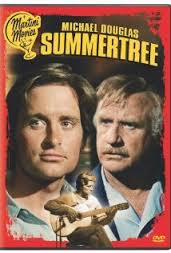
SUMMERTREE
US, 1971, 89 minutes, Colour.
Michael Douglas, Brenda Vacaaro, Jack Warden, Barbara Bel Geddes.
Directed by Anthony Newley,
Summertree is a minor film, but quite an effective one, especially in its look at the younger generation and the generation gap. Kirk Douglas son, Michael, is a guitar-playing twenty year old about to be drafted. This is the occasion for decisions about his future, his love and talent for music, the expectations of his parents, his love for a girl, his social work with an African American boy.
The film obviously has point and is on the side of youth. However, it has a sincerity and human interest that overcomes any preaching and obvious messages.
1. What was the significance of the title of the film and the symbolic nature of the tree (the flashbacks to childhood and the tree as a refuge)?
2. Was this a convincing portrayal of average Middle Americans, their style of life, ambitions, difficulties, conflicts? How?
3. Did you like Jerry as a character? Was he typical of twenty year olds? How?
4. Why did Jerry not share his father's ambitions for him? What was he really interested in - his 'big brother' assignment to the black boy, his guitar-playing, Vanetta, his parents? Would this have been enough for him to live a good life and find happiness?
5. How important was the issue of the draft - his father's attitude of broadmindedness (changing from previous attitudes) and wanting him to have credits to avoid the draft, his mother's concern, Jerry’s unwillingness to fight in the Vietnam war, his attempts to join the conservatory, Vanetta's husband, his father's foiling his plans for Canada, his death?
6. Was the essence of the film the war and draft issue or was it something deeper? What did Jerry's relationship with the boy reveal about him? What did his love for Vanetta reveal? The sequences of his playing the
guitar and the conservatory test?
7. How idealistic or unrealistic had Jerry been? How did he react to the conservatory failure, the boy's rejection of him because of his brother's death, the truth about Vanetta, the call-up, his father paying the garageman to tamper with the car? Did Jerry have enough choices to make his own life? How much was made for him?
8. Were the McAdams? presented in a sufficiently sympathetic way for the audience to sympathise with them as well as appreciate Jerry's dilemmas? Was Vanetta presented satisfactorily?
9. How ironic was the ending with the McAdams? in bed and Jerry’s injuries being shown on TV ? Was this too heavy-handed or did it fit into the film?
11. Was the film too confined to a particular American situation to be of great permanent interest?
Published in Movie Reviews
Published in
Movie Reviews
Tagged under
Saturday, 18 September 2021 19:42
Summer of '42
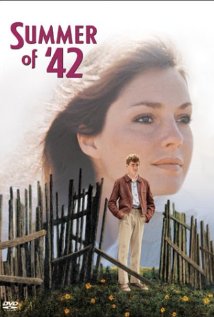
SUMMER OF '42
US, 1971, 100 minutes, Colour.
Jennifer O'Neill, Gary Crimea, Jerry Houser, Oliver Concent.
Directed by Robert Mulligan.
Summer of '42 was very popular in America in 1971. It seemed to correspond to the mood of nostalgia that occupied the country and was manifested in plays, films, fashions etc. However, the film could stand on its own feet at any time. It 1s a film of reminiscence, a man of 1971 thinking back through emotion to the past, the summer during the war, when he was 15, and he fell 1n love with a lovely young woman and she changed his emotional way of life. Other than that the summer of '42 was Just like any summer when boys grew up, talked (especially about sex) and fooled around.
Director Robert Mulligan has made some moving and humane films - To Kill a Mockingbird, Love with the Proper Stranger, Up the Down Staircase, The Stalking Moon. He handles this potentially sensational or potentially syrupy story with a lighter touch so that, while it is full of sentiment, it is humorous, sometimes wry, but directed to adults who are invited to look again at youth, laugh with the.problems and the uncertainties and remember that they passed through the same stage.
Mulligan is assisted by the beautiful colour photography of Robert Surtees who uses a muted, hazy style - 'desaturated’ - which gives the film the visual quality of some of the American landscape painters, like Andrew Wyeth. Michel Legrand contributes another romantic score which does fit in with the mood of the film. Jennifer O'Nelll is charming as Dorothy, the young wife and widow; Gary Grimes has an engaging personality and portrays the uncertainty and bravado of adolescence very well. Jerry Houser makes Oscy like any boy round the place.
It is a piece of popular entertainment of quality.
1. Did you find this film enjoyable? Why? Humorous? Moving?
2. What did the title evoke in terms of memory, sentiment, nostalgia?
3. What note did the adult voice of 1970 at beginning and end, with his comments on memories, add to the film? Was it sadness, regret, content ?
4. What did Robert Surtees' 'desaturated' photography do for the film? would it have been different if photographed more sharply?
5. What contribution did Michel Legrand'a musical score make? Was its sentiment appropriate for the film?
6. Did the 'Terrible Trio' really behave and talk like schoolboys on holidays?
7. Was their fascination by and preoccupation with (and ignorance of) sex ordinary for that stage of their lives?
8. Why didn't we see any parents, but just hear one calling out?
9. Why was Hermie absorbed by Dorothy in the early part of the film?
10. What were your impressions of Dorothy as she said goodbye to her husband, did things around the house after he left and went to sunbake?
11. Comment on Hermie's behaviour in carrying her packages and in his first visit. How did he show his age? How successful was he at acting maturely - e.g, carrying all the parcels, the coffee, his word-choice and manner? Did he change at his second visit to put the boxes in the loft?
12. Why was the visit to the cinema to see Now, Voyager, so humorous and entertaining?
13. Why was the visit of Hermie's to the drugstore included? What was its effect? Was it successful?
14. The youngsters were being laughed at in the night beach sequence. Why was Oscy's attempt to follow his method funny?
15. A commentator said that the climax of the film was dramatically implausible and morally unacceptable. Would you agree? Why did Dorothy give herself to Hermie? Did her letter adequately explain? "I will not try to explain what happened last night because I know that, in time, you will find a proper way in which to remember it."
16. What was Hermie like the next day? How was this shown in his responses to Oscy and his wanting to be alone?
17. What did Hermie learn from this period of his boyhood? The voice at the end of the film says: "In the summer of '42 we raided the Coast Guard Station four times. We saw five movies and had nine days of rain. Benjie broke his watch; Oscy gave up the harmonica and, in a very special way .... I lost Hermie forever. "
18. "The enjoyment of the comic scenes about sex depends on having successfully coped with the problems of youth, or at least, of having forgotten the misgivings and blunders of this uncertain age. For this reason the film would not be entirely appreciated by adolescents. " Do you agree?
Published in Movie Reviews
Published in
Movie Reviews
Tagged under
Saturday, 18 September 2021 19:42
Summer and Smoke
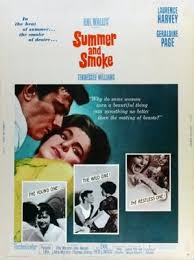
SUMMER AND SMOKE
US, 1961, 128 minutes, Colour.
Geraldine Page, Laurence Harvey, Rita Moreno, Una Merkel, John, Mclntyre, Thomas Gomes, Pamela Tiffin. Directed by Peter Glenville,
Summer and Smoke is the film version of a Tennessee Williams' play first presented on Broadway in 1948. It was not made into a film until a number of other films had been made of successful plays, e.g. about this time there were versions of Cat on a Hot Tin Roof, Orpheus Descending (The Fugitive Kind), Suddenly, Last Summer, and Sweet Bird of Youth.
Once more we are in the South, in New Orleans. Once more we explore human nature and its oddities in this strange environment and society.
This time Williams has created a parable, almost an allegory, of the struggle of flesh and spirit in a person. But he does not take sides and say that flesh is evil and spirit is good. Rather, in the dramatic conflict of the story and its reversal of roles and values, he shows that there must be some kind of coming to terms of both for satisfactory human existence. This is symbolised in the name of the heroine, Alma. She stresses that this is Spanish for soul. Alma is soul. Her story shows that people who so stress the fact that they are souls break and become lost souls.
Geraldine Page portrays Alma brilliantly and was nominated for an Oscar. This role can be compared with her similar roles in Williams1 Sweet Bird of Youth (1962) and in Toys in the Attic (1963). She repeated it in The Beguiled (1970) and caricatured it in Whatever Happened to Aunt Alice (1969). But she is an excellent actress.
Laurence Harvey acts well in a difficult part. He must represent flesh and evil but change to good. He is quite convincing. Direction is by Peter Glenville, also a noted stage director. His most noted films are Becket and the Comedians.
Summer and Smoke is good Williams and, at times, strong drama.
1. How did the prologue of the film set the New Orleans' scene, set the mood and anticipate the plot and theme?
2. What points was Williams making in this use of angels, statues, eternity and the soul? How did these themes pervade the film?
3. What significance did Alma's being a preacher's daughter have? What overtones of American religious beliefs and attitudes did it introduce?
4. Alma's name meant soul. She stressed that the nature of the soul was that it was real, but unseen and spiritual. Only the body is seen. How was Alma herself just a soul, almost a disembodied spirit and soul? How was John flesh and body?
5. Who was the central character, Alma or John?
6. How was the complexity of Alma 'a personality presented: her conflicts, tensions, illness, sense of unreality; the influence of her mother and their way of life, her snobbishness; her nervousness, old maid, spinster; her singing; her flirting and spying. Alma’s soul activities - the meetings and the readings; genteel, yet ready to break out?
7. How did the reactions of other people to Alma reveal her: Dr. Buchanan, the girl for singing lessons; Nelly; her mother and the hat and her regrets with her mother?
8. How was John presented: talented yet irresponsible, callow and callous, depraved, his attitude to Rosie; his gambling, drinking, sex, the cock-fights, his attitude to his father; his selfishness?
9. How seriously did he take Alma? At the beginning, her meeting, his interest in her health and the condition of her heart and his diagnosis of loneliness?
10. The central part of the plot was the interaction between Alma and Johnny, of soul and body and the reversal of roles. How did this begin and what was the effect: John's taking Alma out, Rosie's jealous dance, the gambling, the cock-fight and Alma's disgust at the blood; his love, her frigidity and fear?
11. What did the party at the Buchanan house show of Johns his gambling and prospective marriage, yet his disgust at his depravity?
12. What was the point of Zachariah's speech about getting what he wanted with money and a gun? Did it make the shooting of Dr. Buchanan more credible?
13. Why did Alma make the phone call - jealousy, hatred, self-righteousness, concern?
14. Was Dr. Buchanan's death necessary? Why did he damn his son? What was the effect of Alma's singing?
15. Was John just in blaming Alma for his father's death? What was the point of his lecture to her on anatomy and desires? How right was he?
16. Was John's reaction to his father's death credible? How was he changed?
17. Why was Alma's reaction to the events seclusion and disillusion? How did this change her?
18. Why did her father lie to John? How much was he to blame for what happened to Alma? Why did he lie to her?
19. How did the sequence with Alma and Hellie 's gift bring the dramatic conflict to a head?
20. How had the death of Dr. Buchanan and the subsequent events changed both Alma and John so that the interaction was not only complete, but that they had each changed positions? Why did Alma lose her soul? Had John gained harmony of body and soul?
21. What was the impact of this scene at the statue where she bids eternity farewell and accepts herself as body? What was your reaction as she picked up the travelling salesmen? What would her future be? Were you sorry?
22. What was the symbolism of summer and smoke, the long hot sumsr and the smoke of heat, smoke as a symbol of the elusive soul and of a smouldering personality?
Published in Movie Reviews
Published in
Movie Reviews
Tagged under
Saturday, 18 September 2021 19:42
Suddenly, Last Summer
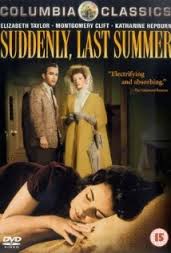
SUDDENLY, LAST SUMMER
US, 1960, 116 minutes, Black and white.
Katherine Hepburn, Elizabeth Taylor, Montgomery Clift, Albert Dekker, Mercedes Mc Cambridge, Gary Raymond. Directed by Joseph L. Mankiewicz.
Suddenly, Last Summer is a Tennessee Williams play and he and novelist Gore Vidal were responsible for the screenplay of this film version. It was made when there was considerable interest in Williams' work in the U.S. From 1956 to 1962 film versions were made of The Rose Tattoo, Baby Doll, Cat on a Hot Tin Roof, The Fugitive Kind, Summer and Smoke, Period of Adjustment, The Roman Spring of Mrs Stone and Sweet Bird of Youth, as well as the present film.
Once again the setting is New Orleans and the strange world of this southern part of the United States with its wealth, decadence and insanity. The drama here is more talkative than in other screen versions of Williams' plays. It is only towards the end that there are any flashbacks to last summer and then these are viewed superimposed with Elizabeth Taylor who is telling the story. It is to the credit of the actors and their skill that the incidents become so vivid even though we see them only at the end. The structure of the film seems very stage-bound, but what the film loses in screen action it gains in long literate scenes of Williams' dialogue. This is where Katharine Hepburn comes to the fore. As a domineering Southern lady she gives a crackling performance as she did in her award-winning Lion in Winter role. Elizabeth Taylor in younger days also acts well, especially as she has to carry the whole of the resolution of the film. She proves that she is a most capable actress. Montgomery Clift who had played opposite Elizabeth Taylor in A Place 1n the Sun in 1951 and Raintree County in 1956, is very subdued here leaving the dramatics to the ladies. Mercedes Mc Cambridge turns in a very good, irritating performance as a Southern mother.
Joseph Mankiewicz directed the film. He made such films as All About Eve and Julius Caesar. His project to follow this one was Cleopatra!
For Williams' fans and those who like unusual literate drama.
1. The structure of the film seemed to remain close to stage structure and could cause the film to be, called very 'talkative'. Did this spoil the effect of the film as a film?
2. What was the effect of screening the credits against the wall of an asylum? How was the film permeated by the theme of madness and the audience reaction to insanity right from the start?
3. The film was set in 1937. Lobotomy was presented as a breakthrough in surgery. How was the scientific atmosphere of the time conveyed, the medical optimism as well as the public fear and the difficult conditions?
4. Did the film make much of Dr Cukrowiaz's dilemma: the pressurising to do the operation on Catherine and the desperate need for money if the asylum was to be able to go ahead with lobotomy operations?
5. What kind of woman was Mrs Venable? What were your first impressions as she descended in the lift? How did Katharine He bum’s delivery of her lines strengthen the impact of Mrs Venable's presence? How was Mrs Venables meant to represent the wealthy New Orleans' way of life?
6. What was the relationship between Mrs Venable and Sebastian? First impressions of Sebastian as a person? His attitudes towards his mother (the incestuous overtones), his pampering by his mother, his poetry, creativity, his stunted development, the symbolism of his garden, the house, the picture of St Sebastian (a martyr killed by arrows), his complete freedom to experiment with life?
7. What was the significance and the symbolism of the long story of the voyage to the Galapagos Islands, the turtles laying their eggs and the sky blackened by birds killing and devouring the turtles, the survival of the fittest? How did Sebastian see the face of God end see life and the world as vengeful? The superfluous turtles were parasites devoured by hungry birds. How is this an image of the death of Sebastian? What God did he see in his death?
8. Why did Sebastian go for the summer trip without his mother? Was he making a break? Was he merely using Catherine because his mother was unavailable? It is said in the film that love means using people and hatred means not being able to use them. What is the meaning of this in the film? Is it true?
9. Had you judged Cathy mad before you saw her? What comment did the film make on society's treatment of the insane; the asylums, the nun, the accusations of the gardener, the scenes of the inmates of the asylum, their faces?
10. What affect had the seduction at the party in the spring had on Cathy? Why was she glad to go with Sebastian? Did she like him? Was her description of him more accurate titan that of his mother? More favourable? Truer?
11. What was the impact of showing Mrs Holly and George? How did they contrast with Violet Venable and with Catherine?
12. Did you believe Catherine was trustworthy? What was the effect of her transfer to Icon's View? Why was she so frightened at the operation? Did her behaviour give adequate cause for the asylum staff to think her insane? What was the effect of her rush into the men's ward? Why did she try to kill herself? What impact did this sequence make?
13. What was the impact of the confrontation between Catherine and Mrs Venable? How ruthless was Mrs Venable in trying to silence Catherine by the operation? Why would she not face the truth? Why could Catherine not face and remember the same truth? What of Mrs. Venable's bribing George and his mother and their reactions?
14. How strong was the force of the decision that Dr Cukrowioz had to make?
15. How was the final confrontation dramatically set up? Mrs Venable' descent and her being put off, Catherine's dependence on Dr. Cukrowioz, the truth drug?
16. Were the flashbacks appropriate or should they have been left to the audience's imagination? Were they effective as they were shown along with Catherine speaking? Why was this a release for Catherine from her potential madness and a facing of the truth? -
17. What was the truth about Sebastian? Why did he use his mother and Catherine for procuring? Did this mean that he really did not love them but himself - narcissism and homosexuality? Why did he not write a poem that summer? What was the significance of his persecution and chase and death? Was this too sensational or did it have meaning?
18. How did Mrs. Venable react to the truth, the symbolism of her shutting his book of empty pages, his death being the poem of 1937? She retreated into madness and unwillingness to face the truth?
19. Was the end of the film satisfying? What did you feel after Cathy's recounting her story? What had you learned about human beings and life?
Published in Movie Reviews
Published in
Movie Reviews
Tagged under
Saturday, 18 September 2021 19:42
Splendour in the Grass/ 1961
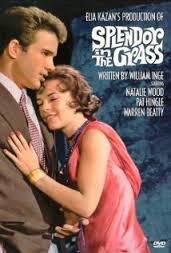
SPLENDOUR IN THE GRASS
US, 1961, 124 minutes, Colour.
Natalie Wood, Warren Beatty, Pat Hingle, Zohra Lampert, Audrey Christie, Sandy Dennis.
Directed by Elia Kazan.
Splendour in the Grass comes from a screenplay by noted playwright William Inge (The Dark at the Top of the Stairs, Come Back Little Sheba, Bus Stop). It was directed by Elia Kazan (Gentleman's Agreement, A Streetcar Named Desire, On the Waterfront).
For those who like strong drama with real feeling, this film is excellent. It is also a worthwhile study of the Generation Gap, or the communication gap between youth and their parents. It shows some of the frightening consequences on impressionable youth when their parents make all the decisions concerning their children's lives or misinform them through ignorance. This happens to rich Bud and poor Deanie and blights their love for each other, spoiling Bud's life and causing Deanie a breakdown. The setting is 1928-32, the film was made in 1960. Despite this, the theme and the treatment are quite relevant to-day.
Natalie Wood was nominated for an Oscar for her performance. Warren Beatty's first role was well done. Pat Hingle's playing of Bud's father is excellently repelling.
1. What was the meaning of the title? Was it explained effectively in the film itself? What do the words in the phrase suggest? What overtones do they evoke?
2. Was the picture of the 1928 Mid- West style of life well recreated? Even though the setting was in the twenties and the film was made in 1960, how relevant was its story and theme today?
3. Was the treatment of the theme too romantic or sentimental or was it satisfyingly realistic?
4. Did Deanie and Bud really love each other? Were they right 'not to go all the way'? Why?
5. Did you think the strain on both of them over-played? Did the film imply that they should have 'gone all the way' and they would have been happy or did it imply that they had to cope with their problem within the moral and conventional framework of their world?
6. Did you like Bud and Wilma Dean? Why? Did the film build up their characters well? - school and class situations, sport, romance, quarrels?
7. Hew did Dannie’s mother influence her - especially her Puritan ideas about sexual feelings, her strictness, her concern about money, her protective love for her baby, her lack of sympathy for Bud? Later in the film she hoped that Deanie did not blame her for her upbringing. Should she have been blamed or did she do the best she could?
8. What influence did Deanie's father have - he seemed only to make comments about drinking milk?
9. What kind of man was Mr Stamper? How effective was Pat Hingle's portrayal of him? Why? Why did he idolise Bud? Why did he force Bud to achieve all his own ambitions? Why couldn't Bud communicate with his father? How weak was Bud in standing up to his father? Why didn't his mother have more influence? Why had Virginia so rebelled against her parents? Why didn't Bad imitate her?
10. Why did Bud physically collapse - whose fault was it? Was he right in breaking off their romance? Why did he refuse Deanie's begging him to consummate their love?
11. Why did Deanie become so neurotic? Whose fault was it? Why was she so desperate to go off with 'Totts' and then to try to kill herself?
12. What effect did her years in the institute have on her? Why couldn't she face her parents after six months? Was she cured after the two and a half years? What did she learn about herself in the institute - from the doctor, from John? Did she really love John?
13. How did Yale spoil Bud's life? Why didn't he keep in touch with Deanie?
14. How desperate was Mr Stamper's final attempt to make Bud succeed his way - the interview with the Dean, the night-club and the dancer? How did the Wall Street collapse affect him? What were the main reasons for hie suicide?
15. Why did Bud marry Angelina? Was he happy with her, the child, the farm?
16. How effective was the final meeting of Bud and Deanie? (Why didn't they tell her he was married?) Did it show?
What future did each of them have?
17. Deanie interpreted Wordsworth's lines about splendour in the grass as the death of ideals as children grow old. Is this what happened in the film?
18. Was this a good example of a film which illustrated its problem of generation gaps, communication, family love, sex and marriage? How good an example?
Published in Movie Reviews
Published in
Movie Reviews
Tagged under
Saturday, 18 September 2021 19:42
Spartacus
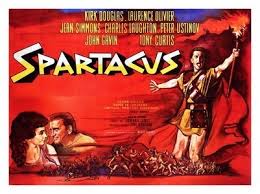
SPARTACUS
US, 1960, 181 minutes, Colour.
Kirk Douglas, Laurence Olivier, Jean Simmons, Charles Laughton, Peter Ustinov, Tony Curtis, John Gavin, Nina Foch, Herbert Lom, Charles McGraw?, John Ireland, Woody Strode, John Dale.
Directed by Stanley Kubrick.
Spartacus is a thinking person's spectacle, immensely interesting and moving on the level of spectacle, with some of the best sequences of Roman warfare ever filmed, but also intelligent in Dalton Trumbo's screenplay about slavery and freedom. The film gives a loathing of freedom in its sharp criticism of the patrician republic embodied in Crassus. Spartacus, the slave, is forced to the surface of revolt by oppression. Perhaps, the oppressed will never win against a harsh establishment, but the message of the film is that the oppressed must try.
Kirk Douglas gives his usual performance. Laurence Olivier is especially striking as the cruel Crassus. Peter Ustinov won an Oscar for his performance as the slave-dealer, the supporting cast, sets, effects (including the symbolic faces and crumbling mask of Saul Bass's credits) are all superb. The film, of course, takes on added historical interest because of the director, Stanley Kubrick. Kubrick is critical of the film because he did not have full artistic control over it.
Spartacus preceded Lolita, Dr Strangelove, 2001, and A Clockwork Orange. Fine film making.
1. What was the purpose of this film? Was it merely a money-making Roman spectacle?
2. "Slavery" and "freedom" were spoken of many times. How did the film explore these themes? What stands did it take?
3. How was Spartacus first presented - in the mines, biting his guard? What humanised him? What effect did the gladiator school have on him? Marcellus? Drama? Varinia?
4. How was the gladiator school a symbol of Roman decadence and oppression, of slavery - the type of training, prison life, the significance of mortal combat of friends for Roman pleasure? What did Spartacus learn from the actions of Draba?
5. What were your first impressions of Crassus? How did the film build up into the opposition of Spartacus and Crassus and all that they stood for? What did Crassus stand for in terms of an old world and patrician Roman conservatism? What values did he want to preserve?
6. Did the slaves have any option but to revolt? Why did Spartacus assume leadership? How did he learn to organise the slaves as well as his army? Why did the slaves join him e.g. Antoninus? Why did he forbid the slaves to let the patricians fight in an arena? What values was Spartacus trying to preserve?
7. What did the Senate sequences show about Rome and its values - the manoeuvres of Gracchus, the ploys of Caesar, the arrogance of Glabrius and the cunning of Crassus?
8. How did the film elicit sympathy for the slaves - note the photography of the children, the old slaves, Varinia end her pregnancy, the humanising of the slaves, the song of Antoninus? Was this too sentimental?
9. Did the slaves have justice on their side? How sorry were you when the combined Roman armies and the departure of the pirates defeated them? Why?
10. How effective were the final battle scenes?
11. How moving was the loyalty of the slaves to Spartacus? How cruel was Crassus' decision to crucify them?
12. Why did Gracchus help Varinia? What role did Batiatus play? How ironic?
13. Why did Crassus want Varinia? Was it love? Was he capable of love?
14. How cruel was the final fight between Spartacus and Antoninus? How noble had Spartacus become in giving his life for his friend?
15. What did Spartacus achieve? How effective would his living legend be? How much of a defeat was this for Crassus?
16. What relevance has this film for our own age?
Published in Movie Reviews
Published in
Movie Reviews
Tagged under
Saturday, 18 September 2021 19:42
Steel
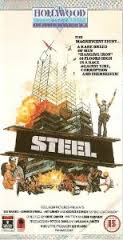
STEEL
US, 1980, 102 minutes, Colour.
Lee Majors, Jennifer O'Neill, Art Carney, Harris Yulin, George Kennedy.
Directed by Steve Carver.
Steel is a routine, tough story about the building industry. It has the patriarch, played by George Kennedy, whose ambitions are carried on by his daughter, Jennifer O'Neill. Art Carney is the family friend. Lee Majors is the steel boss brought in to complete the work. Harris Yulin is the villain. There are the expected conflicts, there is the exhilaration of putting up the building and beating deadlines. Some character actors portray a range of experts in the building trade. Nothing startling, but enjoyably done in its way. Direction is by Steve Carver, director of action films
including Drum, the sequel to Mandingo.
1. Enjoyable American drama? Characters? The American dream? The building industry?
2. City locations, the buildings, aerial shots? Action sequences? Editing and pace? Musical score?
3. The title, its focus, buildings, the need for steel, the enterprise?
4. The focus on Lew Cassidy: driving his chauffeur, ambitions, driving force, speed? Clashes with his brother? Friendship with Big Nose? His working on the site? Helping the man who throws? Falling to his death? The consequences of his death?
5. Cass as his strong daughter, the funeral, the clashes with Eddie? Advice of Big Nose? On the highway, getting Mike to help? her reaction to the woman in the truck? Persuading him? Supporting him? In love, getting him into her society? The success of the enterprise?
6. Mike, tough driver, background in the work, his freezing? Agreement? The women? Going to get his men, persuading them? Tactics for each one? His work on the site, crises, getting the steel during the strike, clashes with Eddie? In love with Cass? His freezing and the reaction of the men, handling situations, the accident on top of the site? The achievement?
7. Eddie, clashes with his brother, his henchmen, the steel, the trucks, his words at the funeral? His calling the wildcat strike? His being defeated?
8. Big nose, Art Carney style, friendship with Eddie? support? The funeral, consoling Cass? His shrewdness and knowledge, the advice about Mike? Supporting Mike? Family friend?
9. The men and their work, danger, their skills, tough, recruited by Mike, their resistance, working, rivalry? Lionel and his friend? The accident?
10. American themes, big business, cities and buildings, achievements? Enterprise, Hard work? Productivity? The tough drama of the American dream?
Published in Movie Reviews
Published in
Movie Reviews
Tagged under
Saturday, 18 September 2021 19:42
Score, The/ Lyftet

LYFTET (THE SCORE)
Sweden, 1978, 117 minutes, Colour.
Anders Lonnbro.
Directed by Christer Dahl.
Lyftet (The Score) is a Swedish film of socialist concern in the late 1970s. It focuses on a criminal who is finally released from jail but finds himself entangles with bureaucratic red tape. He decides then that he will get even by another big score.
The film is based on some Swedish characters of the 1970s, communists who decided that the best way to protest against society was by robbing the capitalists.
The film is serious in its undertones – though comic in it presentation of its characters as well as the situations.
1. The title, its contemporary tone, reference to drugs? Background of crime?
2. A Swedish production, atmosphere, technical side? A portrait of aspects of Swedish society? A critique? A presentation of justice, the prison system? How authentic? The central character as adviser and screen writer?
3. The issues of justice with reference to real people, their lives and backgrounds? Moral issues? The relationship of society to crime, crime prevention, justice?
4. Colour photography, the atmosphere of the cities, the countryside, given work situations? The contrast with prison and the attention to prison detail of cells, offices, corridors, chapel, halls, dining room etc.? The strong score with its various themes and the use of varying instru-ments to highlight atmosphere and dramatic situations?
5. The significance of the opening, the focus on Kenneth and his drug addiction, his need, behaviour in the city, the connections, money? Friends and the decision to rob? The farcical aspects of taking the guns from the school children? The inept robbery and the confrontation by the bank customers, the police reaction and catching them, the interviews and the police promoting themselves and the danger of the situation? A tone given for Kenneth, his companions, the police, justice, prisons?
6. The transition to Kenneth's having spent four years in jail? The effect on him, his wanting to get out desperately, his hopes? Drug-running within the prison? Kenneth and the temptation to use drugs? his friend who acted as his protector? The tension in the final days before his leaving?
7. Kenneth as an average young man, background of family, education, work? His drug addiction and the need for money? His experience in prison and his tough attitudes? let his hopes, abilities? His intel¬ligence? His capacity for violence and his reactions? His confrontations with the guards?
8. The various people in prison? The pushers, Kenneth's companions, work-mates, his protector and his friendliness - and his background of alcoholism? The guards and their being in the drug-running?
9. Swedish prisons and their appearance, the attention to detail, clean, personal belongings and some comfort in the cells? let the separation from society? The personnel working there? The guards and their violence, their being victims of violence by the prisoners? Prisons as reflecting the attitudes of society?
10. The introduction to Karen? Her visit, her love for Kenneth, their love, sexual encounter and its being interrupted by the prison guard? Her waiting for him to come out of prison, her being at the station? Her pregnancy and looking forward to the birth? The introduction to her family - the dour father, the giggling mother? The home, the meal, the discussions? Karen as influenced by her parents? Her parents' dislike of Kenneth? Her decision to go with him, the setting up of the house and the feminine touch to the house? Their life together and the potential for happiness? The hopes for the baby? Karen's reaction to Kenneth's going back to prison, the uncertainty, people not answering her questions, the frustration of the telephone call to the guard? How credible was her desperation and slashing her wrists? The reaction to Kenneth in the hospital, her siding with her parents? Her fear when he arrived after escaping? The reconciliation? How well drawn a character, sympathetic, a victim and unable to cope with difficulties and the unexpected?
11 check
him? The father and his hostility? The advice to Karen? Their hos¬tility to Kenneth and the father being attacked and Kenneth being charged and imprisoned?
12. The importance of work for ex-prisoners, parole rules? The temp¬tations to not conform to the rules? The difficulty in seeking work and its not being available? Strikes and financial difficulties?
13. The build-up to Kenneth's re-arrest - the sequence with the buying of the bed? The misunderstanding, Kenneth as victim, his being delayed, the meetings, bureaucracy, his going berserk and remaining in prison? The pathos of Karen's suicide attempt and Kenneth's release, the feelings of futility?
14. The repercussions of his attack on Karen's father, imprisonment again, the decision for escape, the way this was achieved by the disguise, the religious service? The taking of the mini-bus? The en¬hancing of the reports? The drug connections, the possibility of so much money, the danger with guns and shooting? The death of the friend?
15. Kenneth's advice to give up and return to prison for his own safety? His decision to do so? His hopes? The reconciliation with Karen and his joy in having his son?
16. The presentation, of the Swedish police and their enlarging reports jails, rehabilitation? A portrait of a person and his relationship with society?
Published in Movie Reviews
Published in
Movie Reviews
Tagged under
Saturday, 18 September 2021 19:42
Sea Wolves, The
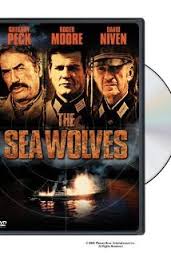
THE SEA WOLVES
UK, 1980, 120 minutes, Colour.
Gregory Peck, Roger Moore, David Niven, Patrick Macnee, Barbara Kellerman, Trevor Howard, Kenneth Griffith, Patrick Allen.
Directed by Andrew V.McLaglan.
The Sea Wolves is old-fashioned adventure: anti-German commando activity in Goa, 1943; good old British derring-do; old stars cavorting (Roger Moore is the youngest) . From the production team of The Wild Geese, especially director Andrew Mc Laglen who used to specialise in Wayne-Stewart? westerns, this true story (far¬fetched heroics) is entertaining with its blend of stiff upper lips and explosions in Indian locations. Gregory Peck and David Niven blew up the Guns of Navarone, so we now expect them to succeed. Barbara Kellerman provides some glamour as the chic society spy. The younger generation may enjoy this kind of action history but the ageing cast and plot is for an ageing audience.
1 . The perennial popularity of this kind of war adventure? The con¬ventions from the forties and fifties? The Guns Of Navarone? A seventies' adaptation of this kind of material - for what audience? British, Commonwealth, International? The age of the potential audience?
2. The conventions of the war genre: the mission, the difficulties, espionage, heroics? The group of people involved - the intrepid com¬mander, the subordinate with impertinence, the spies? The group in¬volved - range of personalities, backgrounds, senses of humour, daring? How well were these characters presented here?
3. Colour photography, the use of Indian locations? The atmosphere of India? The special effects? The mission, the explosions? The rousing musical score - and the song based on the Warsaw Concerto?
4. The film based on fact - presented as fact, as fiction? World War I and espionage in India? The British in India? The veterans of World War I still living in India? Their patriotism - their jingoism? The need for secrecy and cover for the mission? The Lighthorse and their way of life, business? Skills? The going on the mission - the sailing of the boat? The attack on the ship? The background of Pugh and his command? Stewart and the encounter with Mrs. Cromwell? The facts pre¬sented in a screen heroic light?
5. Gregory Peck as Pugh? British background, role in India, discussions with the commander about the espionage? His seeking out of Stewart? The connection with Bill Grice and his address to the Calcutta Light Horse? The preparations for the mission? His arrangements for the ship' The sequences on the ship - difficulties, timing, the engine stopping? The leading of the siege? His being wounded and falling from the ship? The importance of Pugh himself being technical adviser to the film?
6. The contrast with Roger Moore's style as Stewart? Suave manner? (younger than the others?). The encounter with Mrs Cromwell, the fas¬cination, the affair? His link with Grice, with Jack Cartwright? Cartwright's murder? Stewart's persuading of the authorities to have a cover-up carnival? The killing of Mrs Cromwell? The role that Stewart played on the beach? The final heroics?
7. Bill Grice and David Niven's suave style? Representing the men? The old Englishman in India - Mrs Grice? His leadership of the group? The voyage and his role? The siege of the ship?
8. Jack Cartwright and his health, his contribution to the mission, his murder? The range of personalities of the Calcutta Light Horse and their presence on the ship, participation in the mission? Age? Comradeship? (and the irony that these actors had been in so many war films of the fifties and sixties?).
9. Mrs Cromwell and her place in Goa - place in society, access to people? German connections? Her cover? The affair with Stewart? Her using Stewart? Her death? The background of the other interna¬tional spies - their mode of operation? The confrontation by Pugh and Stewart - the necessity of their deaths? The melodrama of their deaths?
10. The basic ingredients of the mission and audience involvement -the danger to British shipping, the need for the destroying of the radio The details of the explosions on the ship?
11. How enjoyable this kind of material? Its particularly British style? The enhancing of heroics and the memory of World War II? Themes of war, heroism, courage?
Published in Movie Reviews
Published in
Movie Reviews
Tagged under
Saturday, 18 September 2021 19:42
Something for a Lonely Man
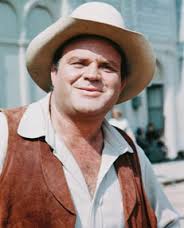
SOMETHING FOR A LONELY MAN
US, 1968, 100 minutes, Colour.
Dan Blocker, Susan Clark, John Dehner, Warren Oates, Paul Petersen, Don Stroud, Henry Jones, Edgar Buchanan, Dub Taylor, Grady Sutton, Joan Shawlee.
Directed by Don Taylor.
Something for a Lonely Man is one of the earliest of Universal Studios’ television movies. It stars Dan Blocker from Bonanza. Susan Clark was emerging as a star of many films at this particular time, in this year with Clint Eastwood in Coogan’s Bluff. Warren Oates had also emerged as a star. There are also a number of veterans from Hollywood days including Edgar Buchanan, Henry Jones and Dub Taylor as well as comedian Grady Sutton.
The film is one about pioneering in the west. A group go west to a small town and are led by a blacksmith. However, there is a crisis when it is discovered that the railroad is to bypass the town. This raises a challenge for the blacksmith as well as a conflict with many of the people who want the town to develop. There is also a threat from Indians. However, this is quite a warm and humane western.
1. The meaning and implications of the title?
2. John Tillybrew as the central character. What kind of man was he? His regard in the town? His successes and his failures? The leadership that he had offered people? His natural shrewdness? Why did people not trust him? The responsive love from Mary? What changed him? The quotation from Emerson?
3. How much of a Western was this? conventions? Atmosphere?
4. The background of the credits and the atmosphere? The train and the engine? The Indians watching?
5. How did Rafe act as a chorus for the film and the commenentary of the action? His reactions as highlighting what John Tillybrew did and what he meant?
6. Mary's brothers? What values did they stand for? As a kind of chorus for the film? Their comments on Mary's behaviour? Their attitudes towards Tillybrew? How much of the impact was comedy?
7. What kind of a person was Mary? Why did she love John Tillybrew? Her relationship to her brothers? Why was she so desperate for his love?
8. The impact of John's visit to San Francisco? importance for the plot? Showing his determination? His shrewdness? What would success have meant to him?
9. What was the significance of the effort he put into racing the engine? What bonds did it create between himself and Mary? Her sharing his dreams? The exhiliaration of racing the engine and trying to move it? How did the engine become a symbol for what he wanted to achieve?
10. The importance of the sequences with the Indians and their stalking John Tillybrew? Their delight at the engine? His communicating with them to get the engine?
11. How surprising was the engine’s falling into the hole and being stuck? What was John's reaction to this? Mary’s? How did this bring about decisions about the whole thing? The various speeches about the use of the engine for the city and its industry? People’s hostility and reactions?
12. How glad were you when they were able to get the engine into the town and that John Tillygrew was vindicated, his detractors were thwarted? How dramatically was this put with the scene?
13. Why was this a successful film? Why was it so warm and humane? Why was it a successful human Western?
Published in Movie Reviews
Published in
Movie Reviews
Tagged under